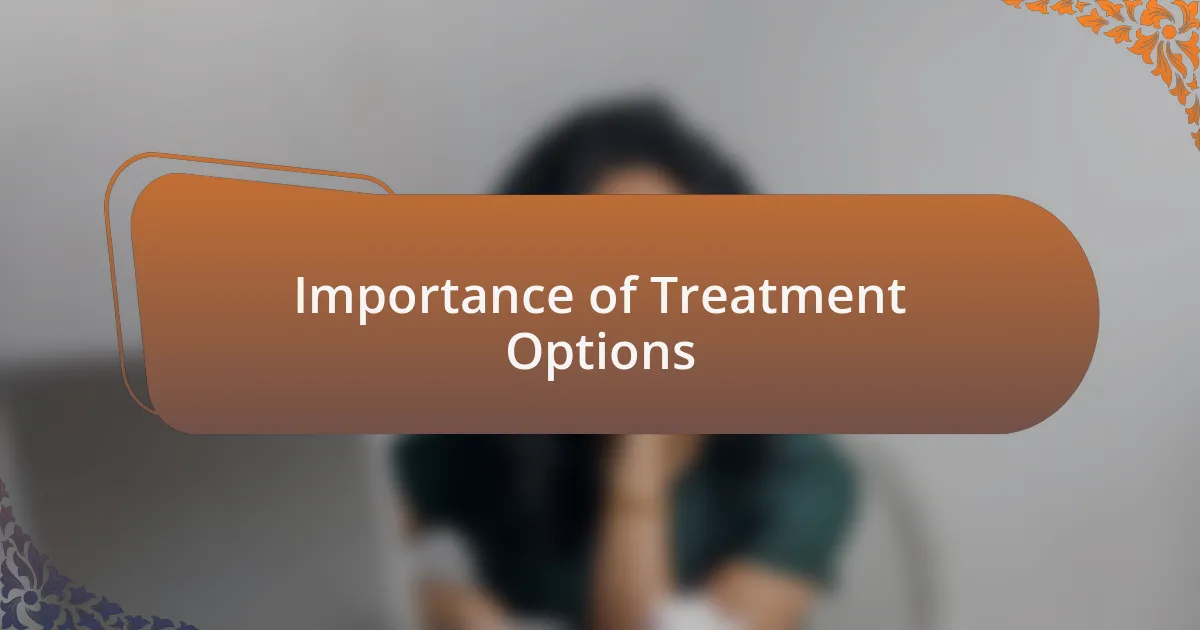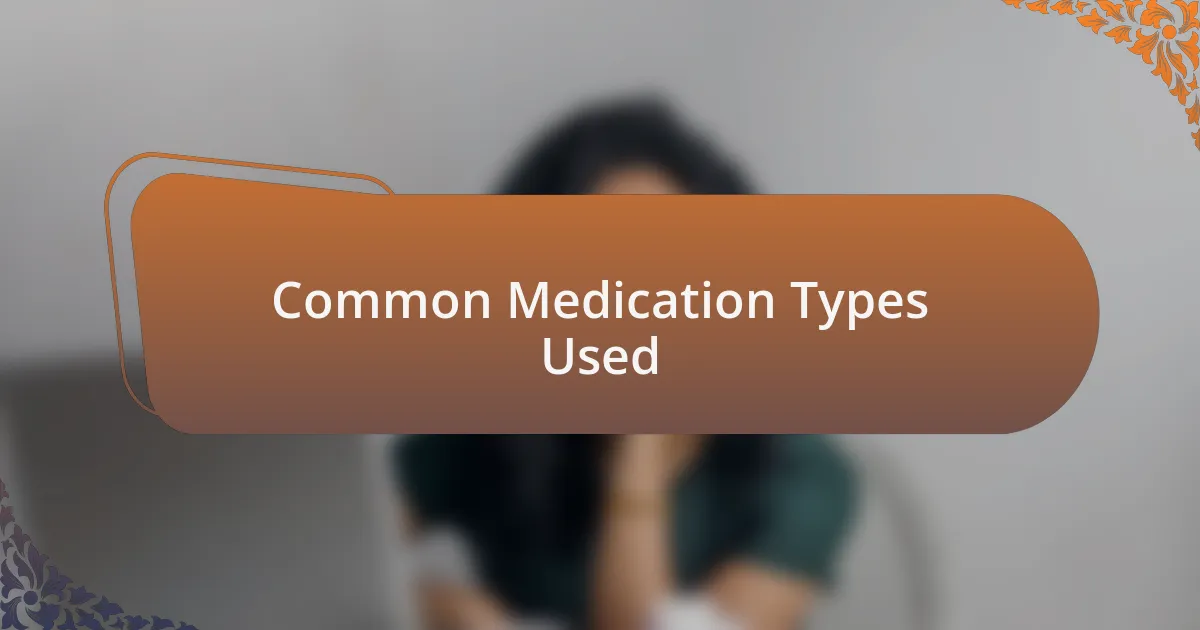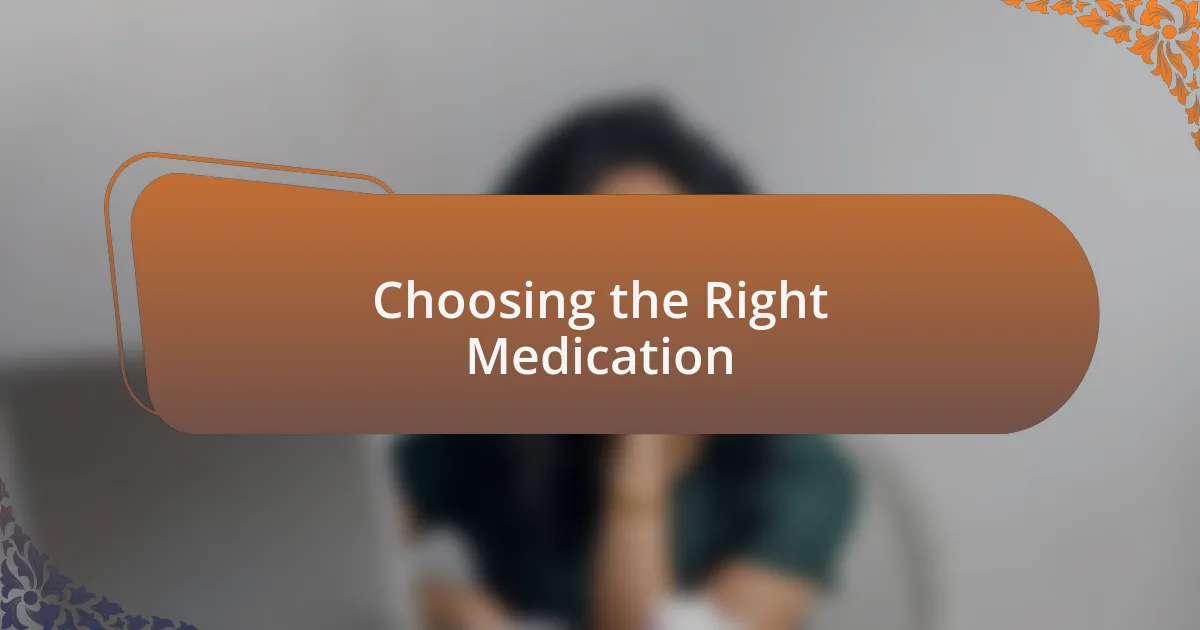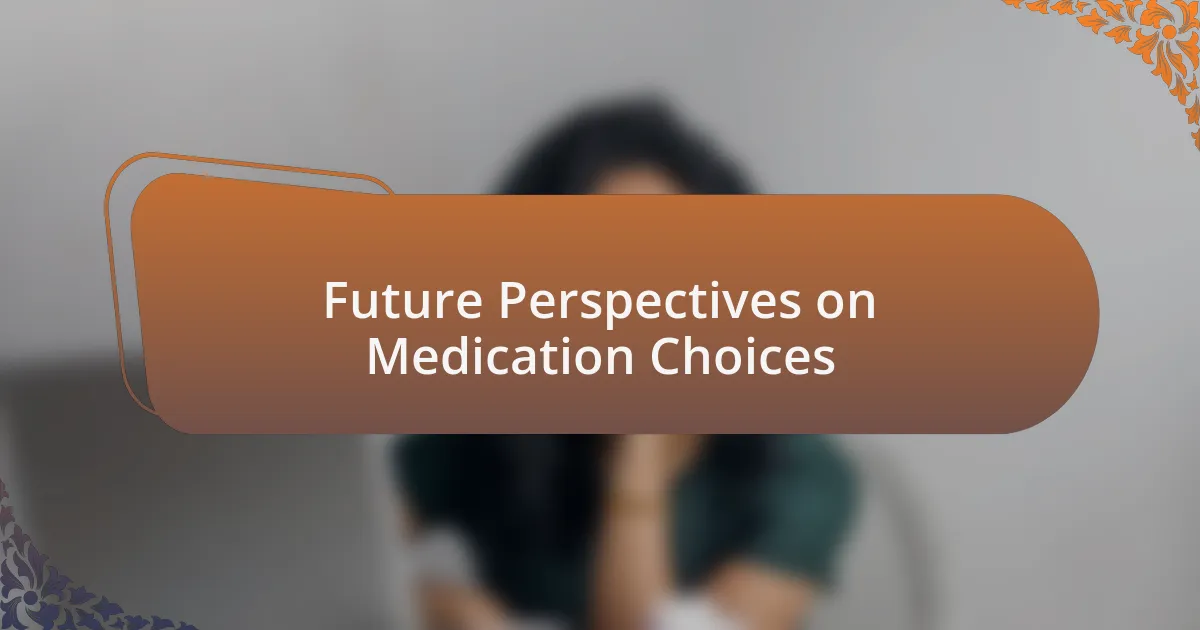Key takeaways:
- Selective mutism is rooted in anxiety, impacting children’s ability to communicate in certain situations, and requires understanding and support from families.
- Treatment options, including therapy and medication, are crucial for helping children manage anxiety and improve their social interactions.
- Common medications like SSRIs and benzodiazepines can significantly reduce anxiety, enabling children to engage more fully in therapy and daily life.
- Choosing the right medication is a personalized process that requires careful consideration and may lead to transformative changes in a child’s social capabilities.

Understanding Selective Mutism
Selective mutism is more than just shyness; it often stems from anxiety that can be overwhelming for children, leaving them feeling trapped in silence. I’ve witnessed moments where a child’s face lights up when they finally feel comfortable enough to speak, highlighting how powerful it can be when they overcome their fears. Have you ever seen someone struggle to join a conversation? It’s heartbreaking to witness, yet it emphasizes the importance of understanding these silent struggles.
For many families, selective mutism can feel confusing and isolating. I remember a time when a parent’s frustration turned to relief after learning about selective mutism as a real condition rather than mere stubbornness. This shift not only changed their approach but opened new avenues for support; isn’t it fascinating how knowledge can empower us to help our loved ones?
At its core, selective mutism is about more than just the inability to speak in certain situations. It reflects a complex interplay of emotional and environmental factors that can vary drastically from one child to another. I’ve seen children go from completely mute in social settings to engaging effortlessly, depending on their comfort levels. What if we viewed these moments not as failures to communicate, but as steps along a path to finding their voice?

Importance of Treatment Options
Treatment options for selective mutism are crucial because they can drastically alter a child’s experience in social settings. I recall a young boy I knew who, with the right combination of therapy and gradual exposure, transformed from a child who would hide behind his mother to one who confidently shared his favorite stories. Isn’t it remarkable how a tailored approach can unlock a child’s potential?
Medication isn’t always the first course of action, but it can play an important role for some children. I’ve spoken with parents who, after much deliberation, opted for medication to help manage their child’s anxiety alongside therapeutic interventions. They described it as a game-changer, as it provided the necessary support to help their child engage more fully in therapy. Have you considered how reducing anxiety could create space for their voices to emerge?
Accessing various treatment options empowers families by providing a broader toolkit to address selective mutism. I have seen firsthand how workshops and support groups can connect families with shared experiences, creating a sense of community that fosters growth. It’s profound to think how exploring these options not only benefits the child but also strengthens the familial bond through shared understanding and support. Who wouldn’t want to see their loved ones flourish in their unique ways?

Overview of Medication Benefits
Medication can offer significant benefits for children grappling with selective mutism by addressing anxiety and improving their overall emotional regulation. I remember a case where a young girl, who could barely speak a word in school, began taking medication that helped ease her overwhelming anxiety. This shift allowed her to start participating in class, gradually finding her voice amid supportive peers and teachers. How incredible it is when a medication can help unlock a child’s ability to connect and communicate!
Furthermore, medication can enhance the effectiveness of therapeutic interventions by creating a more receptive state of mind. In my experience, I have witnessed children who were initially resistant to therapy making remarkable progress once their anxiety was managed through medication. It’s as if a fog lifts, enabling them to engage in the therapeutic process with newfound courage and willingness. Have you ever considered how medication can pave the way for deeper emotional exploration during therapy sessions?
Lastly, for some families, medication provides a sense of relief and stability that can be transformative. I’ve talked to parents who described the relief they felt when they saw their child’s anxiety decrease, allowing them to take part in everyday activities they once avoided. This sense of normalcy can strengthen family dynamics, as activities like classroom presentations or family outings become opportunities for joy rather than fear. Isn’t it comforting to think that medication can help restore that balance and foster connections not just for the child but for the whole family?

Common Medication Types Used
When discussing common medication types used for selective mutism, it’s essential to recognize that many practitioners often prescribe selective serotonin reuptake inhibitors (SSRIs). These medications, like fluoxetine, work by increasing serotonin levels in the brain, which can alleviate anxiety symptoms. I recall a boy who started on an SSRI and, after just a few weeks, began to participate more actively in small group settings. It’s always uplifting to witness such positive changes unfold.
Another option frequently used is anxiety-reducing medications, such as benzodiazepines. While they can provide quick relief during spontaneous anxiety episodes, I’ve found that they are usually more beneficial in short-term situations rather than for ongoing treatment. There was a time when a parent shared with me how their daughter managed to give a speech during a class presentation after taking a benzodiazepine beforehand. Those moments of triumph can be so exhilarating but typically need to be balanced with long-term strategies, right?
Lastly, there are less common choices like buspirone, which can also be effective for anxiety and is considered non-addictive. I’ve spoken with therapists who found that combining buspirone with behavioral therapy worked wonders for their clients, helping them approach social situations without the intense panic that often accompanies selective mutism. Have you ever felt the weight of anxiety lift after finding the right solution? Seeing children thrive on these medications is a reminder that even small adjustments can lead to monumental progress.

Personal Experiences with Medication
Personal experiences with medication can be quite revealing, especially when it comes to managing selective mutism. I remember a young girl who was hesitant to speak even to her family. After starting on an SSRI, she blossomed, sharing her thoughts freely at home. It is astonishing how the right medication can create a shift in a child’s world, isn’t it?
I’ve also encountered families who were initially skeptical about using benzodiazepines. One mother I spoke with shared how her son was able to participate in a family gathering he would have otherwise avoided. Seeing him engage with his relatives warmed her heart, highlighting how medication can sometimes unlock moments that feel unreachable.
Then there’s the case of a teenager I worked with who took buspirone. She described the feeling of walking into a crowded room without the familiar knot in her stomach. That simple relief made a monumental difference in her life. Isn’t it incredible how identifying the right medication can help someone step into their own light?

Choosing the Right Medication
Choosing the right medication often involves a combination of careful consideration and trial and error. I remember guiding a parent through the decision-making process for their child, weighing the differences between SSRIs and natural remedies. It was enlightening to see how they ultimately chose to take a more conventional route, discovering that the results were beyond what they expected.
When I think about the importance of tailoring medication to individual needs, I recall a patient who felt nearly invisible in social settings. After starting on a low dose of an atypical antipsychotic, she slowly began to find her voice. This experience underscored for me just how vital it is to have open discussions with healthcare providers about what works best for a specific individual, don’t you agree?
Finding the right fit in terms of medication is a journey, one that can be frustrating yet rewarding. I recall supporting a young boy who tried multiple options before settling on an SNRI. Watching him progressively open up in school was a testament to the impact the right choice can make. It goes to show that patience and perseverance in this process can truly lead to transformative change.

Future Perspectives on Medication Choices
As I look towards the future of medication options, I am excited by the increasing array of choices that may emerge from ongoing research. For instance, I recently read about experimental treatments that take a more comprehensive approach, considering not only the chemical but also the psychological aspects of selective mutism. Have you ever imagined how different our discussions could be if these new therapies truly become available?
Moreover, the continued emphasis on individualized treatment plans offers hope for more effective outcomes. I once met a parent whose child was on the cusp of a breakthrough, thanks to a personalized medication regimen that combined elements of therapy and medication. It made me realize that as our understanding deepens, the potential for tailored solutions will only grow, creating pathways for children to thrive socially and emotionally.
Finally, I can’t help but wonder about the impact of technology on future medication options. With the rise of mental health apps and teletherapy, we have opportunities that were unimaginable just a few years ago. Just the other day, I saw a demonstration of a virtual reality program aimed at easing anxiety-related disorders and it struck me: could this be the next frontier in treatment? It leaves me hopeful for what’s on the horizon for those affected by selective mutism.